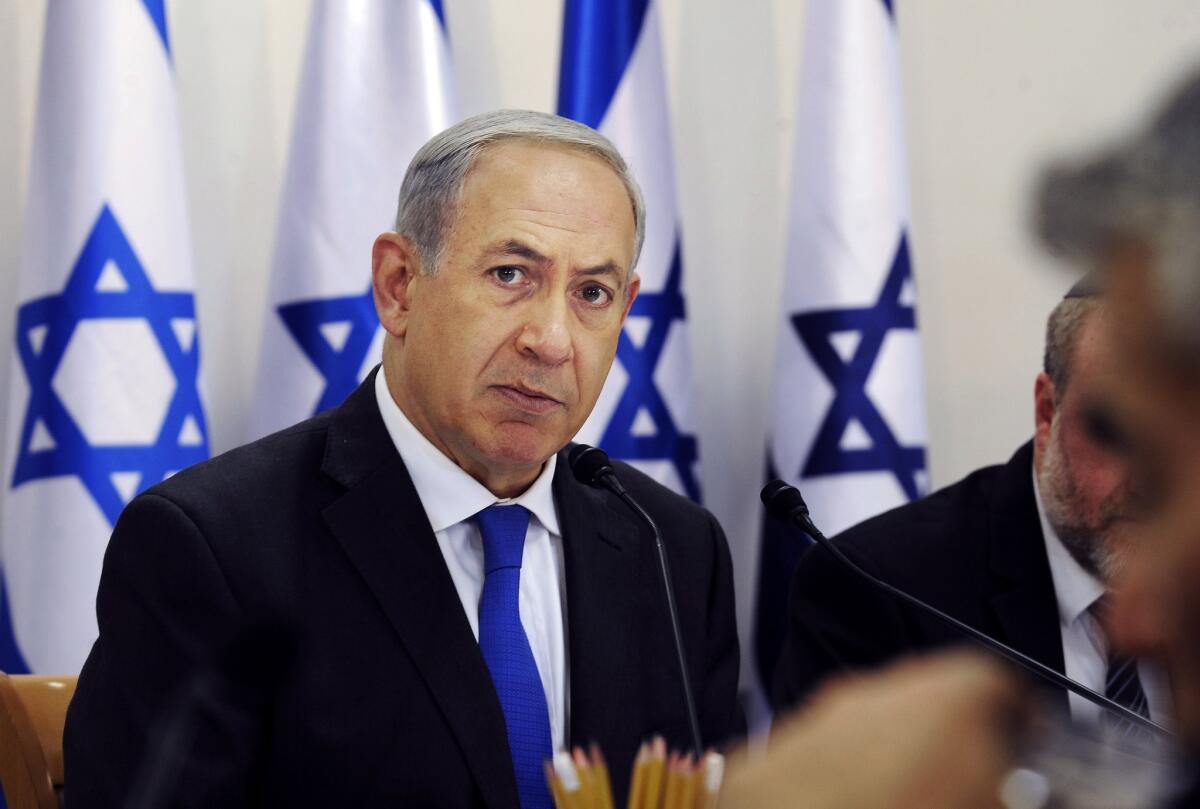Israel’s Netanyahu still concerned about potential deal with Iran

JERUSALEM -- The morning after talks between Iran and six major powers ended in Geneva without an agreement on limiting Tehran’s nuclear program, Israeli Prime Minister Benjamin Netanyahu on Sunday welcomed the delay.
After a harsh statement two days earlier, Netanyahu appeared more sober but still concerned about the emerging deal with Iran. “I am not deluding myself -- there is a strong desire to reach an agreement, I hope not an agreement at any price,” he told his cabinet.
Over the weekend, Netanyahu warned President Obama and other Western leaders that an agreement to reduce sanctions imposed on Iran was “dangerous to world peace” as long as the Persian Gulf nation retained the capability to enrich uranium and pursue development of plutonium.
A week ago, U.S. Undersecretary of State Wendy Sherman gave an interview to Israeli television in which she described the Geneva talks as a first step that would “put time on the clock, stop the nuclear program from advancing” and leave room for negotiating a comprehensive agreement.
Sherman was scheduled to arrive in Israel from Geneva on Sunday with a delegation of U.S. officials to update the Israeli government on the negotiations, Israeli media reported.
Netanyahu’s call to avoid rushing into a deal with Iran has broad support in Israel, including from political adversaries. However, some criticized his tone and warned of clashing with the U.S., which has been negotiating with Iran along with Russia, China, Britain, France and Germany.
Opposition leader Shelly Yachimovich said that Israel was right to warn that the emerging deal was not good, but she added that it was wrong to make it “look like the U.S., our closest ally and greatest strategic asset, is an adversary.”
“Opening several simultaneous fronts with the U.S. is a strategic, political and security mistake,” Yachimovich told Israeli media Sunday, noting that differences exist regarding Iran and peace talks with the Palestinians.
An editorial in the liberal daily Haaretz warned that Netanyahu’s harsh criticism might come back at Israel like “a political boomerang.”
One Israeli diplomatic affairs reporter, Chico Menashe, commented upon returning from Geneva that Netanyahu’s initial strong criticism of the emerging deal seemed to contain “mobilizing code to activate friends in Congress.”
Less subtle was an effort launched by Naftali Bennet, a key member of Netanyahu’s government. In a letter to Jewish organizations around the world, including the influential American Israel Public Affairs Committee, Bennet urged Jews to press their governments to block a deal that did not address Israeli concerns.
Borrowing from boxing, Bennet wrote that Iran is “on the floor and the count is just seconds away from 10.” Now is the time to step up pressure, Bennet said, “and force Iran to dismantle its nuclear program, not to let it up.”
ALSO:
Venezuela frees Miami journalist
Typhoon Haiyan: Thousands feared dead in Philippines
Six nations fail to reach deal with Iran on nuclear negotiations
Sobelman is a news assistant in The Times’ Jerusalem bureau.
More to Read
Start your day right
Sign up for Essential California for news, features and recommendations from the L.A. Times and beyond in your inbox six days a week.
You may occasionally receive promotional content from the Los Angeles Times.






